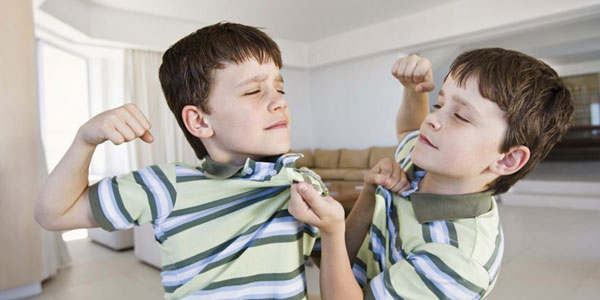
We all have children in the family, be it our own children, nephews or nieces, or even grandchildren. There is something we as adults need to learn: Do not get involved in children’s disputes until there is blood. Kids, particularly only children, need to learn to:
*Communicate
*Negotiate
*Share
*Cooperate
*Be friends
*Fight with other kids
Challenges of an only child
This is one of the skills that siblings teach one another. Therefore, only children, having no siblings, grow up with serious flaws in the skills that prepare them to learn to live in teams and work effectively in them. Having no siblings, they grow up with a deficiency that makes life harder, unless their parents see to it that they have many friends to teach them to share, give in, defend themselves from kids of different ages, and not to be selfish or jealous. Of course, if parents intervene, children will never know how to defend themselves, nor will they learn to negotiate to achieve their goals.
Never get involved in children’s disputes until there is blood. And when there is blood, intervene to clean wounds and ground everyone. Under any circumstance should you take part in the conflict defending any of the parties involved because it will only make the allegedly “guilty” kid feel resentful and more jealous. As an adult, you are not supposed to judge any child without taking into account that you do not know in depth what happened between them.
Of course, I’m not talking about a child who is abused and beaten almost to death, a thing that sadly happens in our schools and where violence and abuse reigns. We are talking about disputes of children who are siblings, friends, and who are simply “looking for attention.”
Believe it or not, these conflicts will help your child. Children need to learn to solve conflicts because when they have them at school and are going through unjust situations, you will not be there to protect them. You have to help them when they are little so they learn how to defend themselves from others later.
And watch out, because many times we tend to protect the smaller ones because we believe they are the most defenseless but the smaller ones are almost always the bad ones. They are the ones who go and pinch, bite, break things from the big ones and come crying ‘my brother took that from me.’ Don’t get involved. Punish the little one too because otherwise you’ll end up creating conflicts and jealousy and behaving in an unjust way by making the other children feel bad.
Lastly, never express you feel any preference towards a child, or say that’s the one you love the most because that’s emotional abuse. Remember that your kids are going to do what you do and not what you say. Careful with that!
¿Cuándo intervenir en un conflicto entre niños?
Todos tenemos niños en la familia, ya sea hijos, sobrinos o nietos y hay algo que los adultos debemos aprender: No se meta en los pleitos de los niños hasta que haya sangre. Los niños, y en especial los hijos únicos, tienen que aprender a:
*Comunicarse
*Negociar
*Compartir
*Cooperar
*Ser amigos
*Pelear con otros niños.
Los retos del hijo único
Esta es una de las destrezas que los hermanos se enseñan unos a otros. De ahí que los hijos únicos, al no tener hermanos, crecen con serias fallas en estas destrezas que los preparan para aprender a vivir en equipos y trabajar en ellos de forma eficaz. Al no tener hermanos, crecen con una carencia que les hace mas difícil la vida, a menos que sus padres se ocupen de que tengan muchos amigos que les enseñen a compartir, ceder, defenderse de niños de diferentes edades, no ser egoístas, ni celosos. Claro que si los padres intervienen, los niños nunca sabrán defenderse por sí solos, ni aprenderán a negociar para lograr objetivos.
No se meta nunca en los pleitos de los niños hasta que haya sangre. Y cuando haya sangre, intervenga para limpiar las heridas y a castigarlos a todos. Bajo ningún concepto tome parte en el conflicto defendiendo a uno ni a otro, porque solo logrará que el niño supuestamente “culpable” se sienta resentido y más lleno de celos. Como adulto, se supone que usted no debe juzgar a ningún niño sin tener en cuenta que usted no conoce a fondo lo que ocurrió entre ellos.
Claro que no me refiero a un niño que es abusado y golpeado hasta casi morir cosa que tristemente pasa en nuestras escuelas y donde reina la violencia y el abuso. Estamos hablando de pleitos de niños que son hermanos, amigos y que simplemente están “buscando su atención”.
Aunque usted no lo crea, esos conflictos ayudarán a su hijo. El niño tiene que aprender a resolver los conflictos porque cuando los tenga en la escuela y se vea sometido a situaciones de injusticia usted no estará ahí para defenderlo. Tiene que ayudarlo cuando es pequeño a que él aprenda a defenderse de sus iguales que son sus amigos.
Y ojo, porque muchas veces tendemos a proteger a los chiquitos porque creemos que son los más indefensos pero los chiquititos casi siempre son diablitos. Son los que van y pellizcan, muerden, rompen las cosas de los grandes y vienen llorando ‘ay mi hermano me quitó esto’. No se meta. Ponga al chiquito también de castigo porque sino usted terminará generando conflictos y celos y se comportará de una manera injusta al hacer que los otros niños se sientan mal.
Por último, nunca exprese que siente preferencia por un hijo, ni diga que ese es a quien más quiere porque eso es abuso emocional. Recuerde que sus hijos van a hacer lo que usted haga y no lo que usted diga. ¡Cuidado con eso!
www.nancyalvarez.com Tienda: https://tienda.nancyalvarez.com FB: DraNancyAlvarez
Twitter: @dranancyalvarez Instagram: dranancyalvarez Youtube: nancyalvarez51










